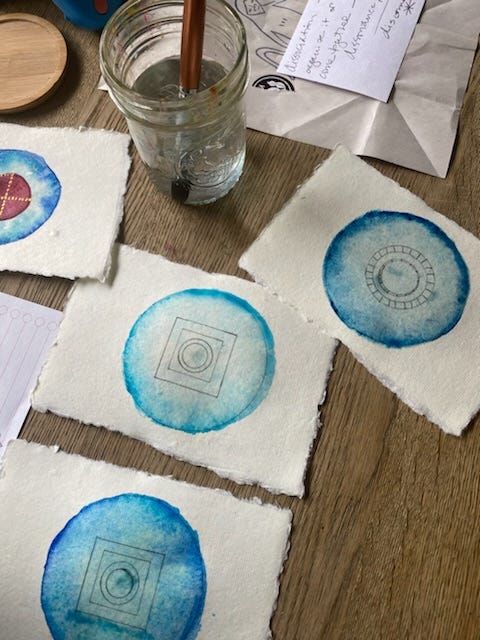I was talking with Hayes the other day and said, “I guess when you start to unravel the sweater, each row comes undone quicker than the last.”
Or something like that.
It’s a blessing and a curse.
The more progress I make in seeing myself clearly, the more frustrated I become at the self I’m seeing. These inconvenient truths I’m unearthing don’t make it easy to coast along. I have to make space and time for long conversations, sitting and thinking, fits of crying coupled with the utter inability to be reasonable, and also fits of uncontrollable laughter. It’s okay. I’m looking forward to being a ball of yarn.
Yesterday morning’s ACA reading was about cross talk. For those unfamiliar with 12-step meetings, that means you aren’t allowed to mention what someone else said while they were sharing when you are. You keep your focus on you and you only. That got me thinking about how the people I was raised by communicated, as a general rule. The idea of cross talk? If you didn’t cross talk, you didn’t talk at all. Judgment, criticism, and cynicism were used as armour, as well as holding what others said in reserve to use later, of course. I think about my grandmother - my father’s mother - and how acidic her tongue could be, how her seething discomfort and hurt and sadness permeated the room sometimes. She was a perfectionist like I am. Then I think about how that must’ve come from somewhere, and I think of who must’ve shown her how to be that way.
My mother-in-law recently introduced me to the term cycle breakers. I would like to be one of those. By the way, I may never get another chance to tell you how lucky I am to have my mother-in-law in my life, so I’m going to do it now. I treasure her.
I guess what I’m digging for here is there was a genuine generational lack of tenderness in my bloodline. A severe one. That doesn’t mean anyone was bad. It just means they knew one way to do things and that way wasn’t the most compassionate or tender. I think most of us have similarities in our backgrounds, don’t we? Now we’re starting to wake up to it and try to change it. Maybe we’re becoming more aware of ourselves as human beings and with the fact that behaviors have effects, maybe life isn’t as hard for some of us as it was for most of us at one time and, we have the luxury of thinking about things like how tender we are with each other. I don’t know. But what I do know is there was a an element of brusqueness in the manner of some in my father’s family that feels like poison in my blood. There was a lot of stomping, snatching, and unhappiness. Snide remarks were plentiful.
I don’t want to stomp, snatch, or be unhappy or snide. I certainly don’t want to pass those isms down to my son, who is blessed to have such a gentle way. But the only way I don’t become it is to forgive it. People only do what they are shown to do until they know a better way to do. And I have to keep on working, because I do know a better way to do. I’m lucky enough to be learning. Doing the work, as it’s called. I feel like I haven’t even begun. But maybe I’m at least starting to understand that making life feel okay doesn’t have to be about perfection — not seeking it in myself and certainly not in others — but that making life feel okay is maybe about employing the practices that get me from one awkwardly graceful minute to the next, the practices that have been with us for so long: prayer, meditation, connecting the mind, body, and spirit, connecting with others, connecting with nature, deepening the experience on the planet — they really do apply. They are what work when it comes to forgiveness. They ARE the work, aren’t they? They are what unravel the sweater. They smooth out the knots. These practices are what allow me to get quiet, to get humble, to ask for forgiveness and see myself as nothing but completely equal to the person standing beside me. Even as completely nothing. When I see one thing, I can see the next.
That doesn’t mean I don’t lose sight of all I find over and over too. I do. Maybe that’s why we say every day is a new beginning. When I think of it the context of recovery or healing, it is certainly true.
I’m trying to name the unnameable.
Maybe it’s this: It’s hard to change. I’m so grateful for growth and what I get to learn and understand. I’m so grateful for this day. I’m grateful to have a chance to be a cycle breaker. I hope I make it.
Peace and Love,
Allison
Mandala tributes in progress. These will be available to you soon.
And I’m sorry again for the lack of audio — I’m still not over that cold. I plan to make it a regular feature of these posts.





Allison, you’re already a cycle breaker with your keen awareness, insight, and desire to change. Once you unravel the yarn, it still has some kinks, but it can be used again and again to create something completely new. The story you tell is not a “yarn” (or a yawn) because it’s completely valid and truthful.
Your writings really help me to try and come to terms with & try to forgive my father who was an alcoholic. Thank you.